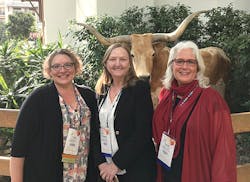The 2019 Clinical Laboratory Management Association (CLMA) annual conference was held in Grapevine, TX this year. The CLMA KnowledgeLab is one of my favorite conferences to attend based on several reasons: its intimate size, its quality vendors, and its regular attendees (a special shout-out to my SAFMLS friends!). I’ve highlighted a few of my favorites, below:
In its fourth year attending CLMA, the Society of American Federal Medical Laboratory Scientists (SAFMLS) is a non-profit organization established in 1971. Membership is open to qualified military (active and reserve), Public Health Service, and Veteran’s Administration personnel, and their affiliated scientists that support healthcare via laboratory research and evaluation. Their primary objective is, “maintaining and enhancing high professional standards through improved laboratory policies and technology in support of the healthcare delivery systems.”1 Explore SAFMLS, here: https://www.safmls.org/.
Always on the lookout for something interesting, I happened upon Bobby Tschann, US-Fungitell Account Manager at the Associates of Cape Cod, Inc. Their tagline is, “Your Endotoxin & Glucan Experts.” They were displaying their Fungitell Assay (FDA-cleared and CE marked) for rapid invasive fungal infection (IFI) screening. Their assay is manufactured using horseshoe crab blood. (Interesting fact: horseshoe crabs use hemocyanin to carry oxygen through their blood. Because of the copper present in hemocyanin, their blood is blue.) They have a cool Horseshoe Crab Sustainability Project which focuses on supporting fisheries worldwide and ensuring the genetic diversity of the horseshoe crab. Learn more, here: http://www.acciusa.com/.
If you’ve ever had to undergo an invasive colonoscopy, you’ll appreciate this next product—Epi proColon. Epi proColon is an FDA approved colon cancer screening blood test. Marketing Director David Bull explained to me that their goal is addressing non-compliant patients (those unwilling or unable to be screened by stool-based, direct visualization, and/or serology tests). In a clinical study, 99.5 percent of twice non-compliant persons completed the blood test.2 Discover more, here: https://www.epiprocolon.com/us/.
I made a new acquaintance at the Center for Surveillance, Epidemiology, and Laboratory Services (CSELS), a Division of Laboratory Systems (DLS) at the Center for Disease Control (CDC) in Atlanta, Georgia. James Bratton, fellow editorial guru and Japanophile, exposed me to their government funded programs, including laboratory eLearning tools, courses, and resources—many of which are FREE. Browse their full catalog of lab-centric opportunities at https://www.cdc.gov/csels/dls/ and DLS training courses at https://www.cdc.gov/labtraining/.
Last, but not least, I connected with the dedicated team at Visiun, among them, Technical Support Specialist, Vanessa Hawrylak. With Visiun’s support, Vanessa is seeking a lab who can donate a waived chemistry analyzer to help build a small STAT lab in her crisis-stricken home country of Venezuela. Any other lab supplies that are no longer needed are also being accepted. Read more about Vanessa’s honorable efforts in our chemistry feature found on page 16.
Looking forward to seeing old and new faces next year in Louisville, Kentucky for KnowledgeLab 2020 from March 29 – April 1, 2020!
REFERENCES
1. SAFMLS. The Society of American Federal Medical Laboratory Scientists. About Us. https://www.safmls.org/about-us. Accessed May 1, 2019.
2. Liles E. Et al. Colorectal cancer screening uptake is higher with a blood test than with a fecal immunochemical test when offered in the clinic: Cancer Treatment and Research Communication. 2017, 10:27-31.

